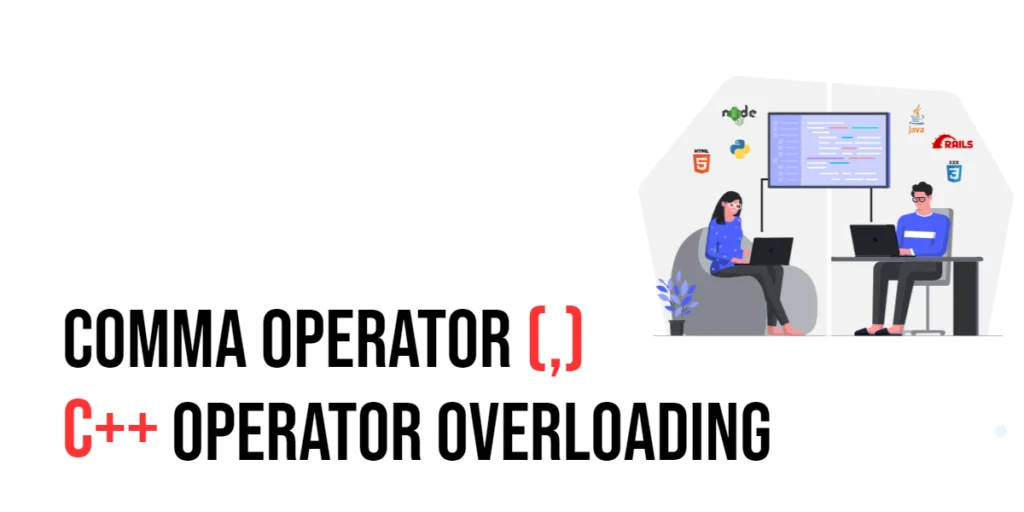In C++, you can tailor how operators work with your custom types through something called operator overloading. This feature can transform your code, making it as straightforward and predictable as the language’s standard types. Commonly, developers adjust operators like + or < to fit their needs, but there’s an underappreciated operator that often gets ignored: the comma operator (,). This article explores the intriguing possibilities of overloading the comma operator in C++. We’ll break down the process, showing when and why you might want to use this technique, complete with detailed examples to ensure even beginners can follow along easily and understand the benefits.

with hands-on learning.
get the skills and confidence to land your next move.
Understanding the Comma Operator in C++
The comma operator (,) in C++ has a unique yet straightforward role: it processes two expressions sequentially. The first expression is evaluated and its result is discarded, and then the second expression is evaluated, with its result being the value of the whole operation. This operator is typically used to execute multiple statements where only one is expected, without disturbing the order in which the expressions are evaluated.
Consider this example:
int x, y;
x = (y = 3, y + 2);In this code, y is first assigned the value 3. Following that, x is assigned the value of y + 2, which results in 5. The operations within the parentheses are carried out one after the other.
Why Overload the Comma Operator?
Overloading the comma operator can be particularly powerful in scenarios where sequences of operations need to be performed in a specific order. This functionality is not just about operations; it’s about control and ensuring steps are followed precisely. It’s especially useful in situations such as:
- Creating Domain-Specific Languages (DSLs): Custom behaviors in DSLs can be defined to enhance readability and workflow specific to a domain.
- Managing Resource Acquisition: Ensuring resources are acquired and released in the correct order.
- Initializing Complex Structures: When setting up complex structures, ensuring each component is initialized sequentially and correctly.
How to Overload the Comma Operator
Overloading the comma operator in C++ follows the same general principles as overloading other operators but with a key difference—it must be a member function. This requirement ensures that the overloaded operator behaves in context with objects of your class. Here’s how you can define it:
ReturnType operator,(const ClassName& right);This function takes another object of the same class as a parameter and defines how to combine the current object with the right-hand object in a sequence. The ReturnType typically is a reference to the class itself, allowing for chaining operations.
In simple English, overloading the comma operator lets you dictate what happens when two objects of your class are placed side by side in a comma-separated list. This is not just about making the code work—it’s about making it work your way, ensuring that every step follows your defined process, which can be crucial for maintaining order and clarity in complex operations.
Example: Logging and Actions
Imagine you’re developing a logging system to track various operations in a software application. Each operation needs to be recorded in a specific sequence. To streamline this process, we can overload the comma operator in C++. This will allow us to log multiple operations in sequence automatically, enhancing code clarity and reducing manual logging errors.
Here’s how you could set up such a system:
#include <iostream>
#include <string>
class Logger {
private:
std::string log;
public:
Logger() : log("") {}
// Overloading the comma operator
Logger& operator,(const Logger& other) {
log += other.log; // Append the log of the other instance to this instance
return *this; // Return the current instance
}
void addEntry(const std::string& entry) {
log += entry + "; "; // Add new log entry with a delimiter
}
void printLog() const {
std::cout << "Log: " << log << std::endl; // Display the complete log
}
};
int main() {
Logger a, b, c;
a.addEntry("Initialized"); // Log the initialization
b.addEntry("Started"); // Log the start
c.addEntry("Stopped"); // Log the stop
a, b, c; // Using the overloaded comma operator to combine log entries
a.printLog(); // Output: Log: Initialized; Started; Stopped;
}In this code, we create a class Logger that holds a log string. Each Logger object can store its own sequence of log entries. By overloading the comma operator, we allow for a clean and intuitive way to concatenate log entries from different Logger instances. When a, b, c is executed, the logs from b and c are added to a’s log, resulting in a single consolidated log string that records the sequence of operations.
The overloading of the comma operator in this example demonstrates how you can manipulate typical C++ operations to suit specific needs like logging. It simplifies the syntax for combining multiple operations, ensuring that the code remains easy to read and manage. This technique is especially useful in scenarios where operations are interdependent or need to be executed in a specific order.
Key Considerations When Overloading the Comma Operator
- Clarity and Readability: While overloading the comma operator can offer unique and efficient solutions, it also carries the risk of making your code less clear and more complex for others to understand. It’s vital to ensure that using this feature actually enhances the functionality in a way that is obvious to other programmers. If it simply complicates or obscures what the code is doing, it might do more harm than good. Always aim to keep your code as straightforward and transparent as possible.
- Consistency: When you choose to overload an operator like the comma, it’s crucial to retain a sense of the original purpose and behavior of the operator. This means that your overloaded operator should integrate seamlessly into the language, complementing its innate characteristics rather than contradicting them. This consistency helps in keeping your code intuitive and predictable, which is especially important in large projects or teams.
- Performance: It’s important to remember that overloaded operators are essentially function calls and can introduce overhead that doesn’t exist with their built-in counterparts. This can lead to a decrease in performance, particularly in performance-critical applications. Always consider the efficiency of your solution and be mindful of any potential slowdowns introduced by overloading operators.
Conclusion
Overloading the comma operator in C++ can be a dynamic tool in your programming arsenal, particularly when used thoughtfully and appropriately. It offers a way to define more sophisticated behaviors in a concise manner, which can be particularly beneficial in complex systems or advanced programming tasks. However, the power of operator overloading comes with responsibilities—primarily, the need to maintain clarity, consistency, and performance.
Whenever you decide to use this feature, be thorough in your implementation and testing to ensure that the behavior of your overloads remains predictable and efficient. By adhering to these principles, you can harness the full potential of operator overloading to create clean, effective, and maintainable code.







